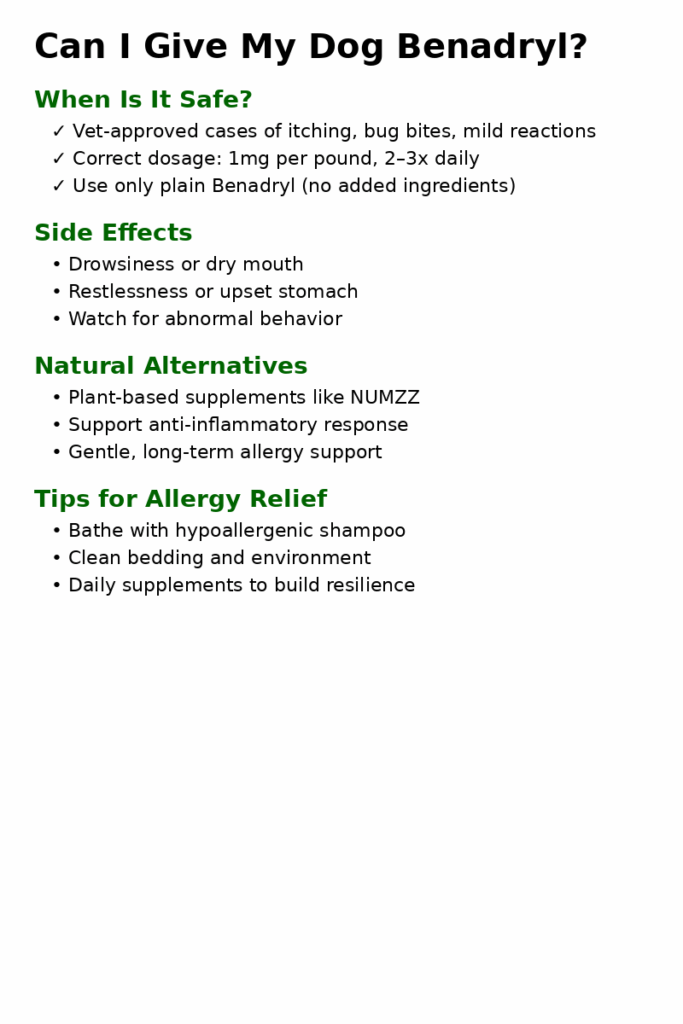Can I Give My Dog Benadryl? What You Need to Know About Allergy Relief for Dogs
Share This Post
When your dog is dealing with itchy skin, seasonal allergies, or an unexpected reaction to a bee sting, it’s only natural to want fast relief for your furry friend. A common question many pet parents ask is: “Can I give my dog Benadryl?”
The short answer? Yes—but with caution. Benadryl, known generically as diphenhydramine, is an over-the-counter antihistamine that can be safe for dogs in the right dose and under the right conditions. However, before reaching for the medicine cabinet, it’s important to understand the risks, proper dosage, and natural alternatives available—like NUMZZ’s plant-based, kratom-infused supplements designed specifically for dogs.
What Is Benadryl and How Does It Work?
Benadryl is a first-generation antihistamine commonly used in humans to treat symptoms of allergies, hay fever, insect bites, and even motion sickness. It works by blocking histamine receptors—histamines are the chemicals your body releases in response to allergens.
In dogs, Benadryl may help:
- Relieve itching and inflammation due to allergies
- Calm mild reactions to bug bites or stings
- Reduce symptoms of motion sickness
- Soothe some vaccine-related reactions
But while Benadryl can offer some relief, it’s not a cure-all and should never be a long-term solution without veterinary guidance.
Is Benadryl Safe for Dogs?
In general, yes, Benadryl can be safely given to dogs—but only:
- After consulting a veterinarian
- With the correct dosage
- As a short-term remedy
Important Safety Notes:
- Never give dogs Benadryl with added ingredients such as decongestants or pain relievers (e.g., Benadryl-D), as these can be toxic to dogs.
- Puppies, senior dogs, and certain breeds (especially brachycephalic or short-nosed breeds) may have a harder time tolerating it.
- Underlying health conditions such as heart disease, glaucoma, high blood pressure, or thyroid issues may contraindicate use.
Recommended Dosage of Benadryl for Dogs
The standard dosage for dogs is 1 mg of Benadryl per pound of body weight, given 2-3 times a day. However, dosages may vary based on:
- Age
- Size
- Overall health
- Specific symptoms
Always use plain Benadryl tablets or capsules. Liquid forms often contain xylitol, a sweetener that is toxic to dogs.
Still, because every dog is different, talk to your vet before giving any new medication.
Side Effects to Watch Out For
Even when used properly, Benadryl may cause side effects in dogs. The most common include:
- Drowsiness or sedation
- Dry mouth
- Urinary retention
- Increased heart rate
- Diarrhea or upset stomach
In rare cases, dogs can have paradoxical reactions, such as restlessness, hyperactivity, or aggression.
If you notice any unusual behavior or symptoms after administering Benadryl, discontinue use and contact your vet immediately.
When Benadryl Might Not Be Enough
Benadryl can treat symptoms, but it doesn’t address the root cause of allergies or inflammation in dogs. If your pup is experiencing chronic issues like:
- Ongoing skin irritation
- Frequent ear infections
- Scratching, licking, or chewing
- Seasonal or environmental allergies
…then a more comprehensive, long-term solution may be required.
Natural Alternatives to Benadryl for Dogs
For pet parents looking for safer, holistic options, natural supplements can offer effective relief without some of the harsh side effects of pharmaceuticals.
NUMZZ: A Natural Alternative That Supports Wellness
NUMZZ supplements are designed for dogs using plant-based ingredients, including mitragyna speciosa (kratom)—a botanical traditionally used to ease discomfort, reduce inflammation, and support calm behavior.
While not a pharmaceutical antihistamine like Benadryl, NUMZZ products:
- Support the body’s natural anti-inflammatory response
- Promote calm behavior during allergy discomfort
- Help dogs manage seasonal sensitivity
- Encourage overall immune and joint health
Many pet owners are discovering that consistent, natural supplementation not only soothes symptoms but also enhances their dog’s resilience to environmental triggers over time.
Tips for Managing Dog Allergies Naturally
Even if you decide to use Benadryl occasionally, consider supporting your dog’s wellness with these long-term habits:
- Regular Baths with Hypoallergenic Shampoo
Wash away allergens from fur and skin. - A Clean Living Environment
Vacuum regularly and wash bedding to remove dust and pollen. - Balanced Diet and Supplementation
A diet rich in omega-3s, antioxidants, and natural anti-inflammatory compounds can reduce flare-ups. - Natural Supplements Like NUMZZ
When used consistently, natural options can ease discomfort and promote ongoing wellness.
Final Thoughts: Is Benadryl the Best Choice for Your Dog?
While Benadryl can be useful for short-term relief in certain cases, it’s not without its risks. Always consult your vet before giving it to your dog, especially if it’s not a one-time need.
If you’re looking for long-term solutions that support your dog’s health in a more natural and gentle way, NUMZZ may be worth exploring.

